Spotting Scam Tactics
Spotting Scam Tactics: How to Protect Yourself and Your Money
Scammers are constantly finding new ways to trick people, but their playbook is surprisingly predictable once you know what to look for. Sometimes scams come in the form of a phone call that makes your heart race, maybe as an email that looks a little “off,” or a message on social media that feels too good to be true.
No matter how scammers come for you, their goal is always the same: to gain access to your money or personal information. At Luminate Bank, your security is a top priority, which is why we want you to feel confident recognizing the red flags of fraud.
How Scammers Manipulate Victims
One of the most common tricks scammers use is urgency. You might get a text that says, “Your account will be locked in 10 minutes unless you act now.” That pressure is intentional and is designed to override your better judgment and push you into making a rushed decision.
Another familiar tactic is impersonation. Fraudsters often pose as someone trustworthy, such as a government agency or a bank representative. For example, a scammer may claim they’re from “tech support” and ask to remotely access your computer to fix a supposed virus. Because they sound professional and may even spoof a legitimate phone number, the request can feel convincing.
Emotions are another powerful tool. Some scammers dangle unbelievable offers, such as an email saying, “You’ve won $25,000! Pay a small fee to claim your prize.” Others rely on fear, warning that “Your grandchild has been kidnapped! Send money now.” In both cases, emotions are manipulated to cloud judgment and push quick compliance.
Newer Schemes to Watch For
Technology has given scammers even more ways to reach potential victims. Fake websites are carefully designed to look like the real thing, asking you to log in to “verify” your account. A small difference in the web address (like an extra letter or odd domain ending) is often the only clue.
Other times, criminals may demand confidentiality. They might say, “You are the subject of a criminal investigation. Do not discuss this with anyone or risk severe penalties.” By isolating you, scammers reduce the chance that friends, family, or your bank will help stop the fraud in time.
Quick Red Flags of a Scam
While scams come in many forms, there are some telltale signs that should immediately raise suspicion:
- Pressure to act right away
- Promises of large rewards or easy money
- Out-of-the-blue contact from someone claiming authority
- Requests for secrecy or untraceable payments
Your Partner in Protection
The good news is that once you know these tactics, they’re easier to spot and avoid. If you’re ever unsure, pause before taking action and verify the request directly with the organization. And remember, you don’t have to face fraud alone.
At Luminate Bank, your security matters just as much as your financial goals. We continuously monitor accounts for suspicious activity, protect your information with secure technology, and provide resources to help you stay informed. By staying alert and partnering with us, you can feel confident that your money, and your future, are in safe hands.
Let’s Chat.
Are you ready to navigate the real estate market with confidence? Contact us today to discuss how you can take advantage of current market opportunities.
Michelle Oddo
Mortgage Wealth Advisor, The Oddo Group
michelle.oddo@goluminate.com
(303) 961-6906

AI Is Putting Your Home in Front of Buyers
From Browsing to Buying: How AI Is Putting Your Home in Front of More Buyers
Think the housing market is quiet right now? Think again.
Behind the scenes, there’s a whole lot of digital window shopping going on, and the numbers prove it. Even if it’s not making headlines, buyer curiosity is heating up, and that could be great news if you’ve been considering selling.
Search Trends Show Buyer Interest Is Heating Up
One of the easiest ways to see what’s on people’s minds is to look at what they search for online. Google Trends is like a peek into the collective curiosity of millions of people, and right now, it’s showing something interesting: searches for phrases like “home for sale” have been steadily climbing in 2025.
In fact, both “home for sale” and another common homebuying phrase recently hit a two-year high in mid-July. That’s not just a random spike, but a sign that curiosity (and maybe even serious intent) is building again.
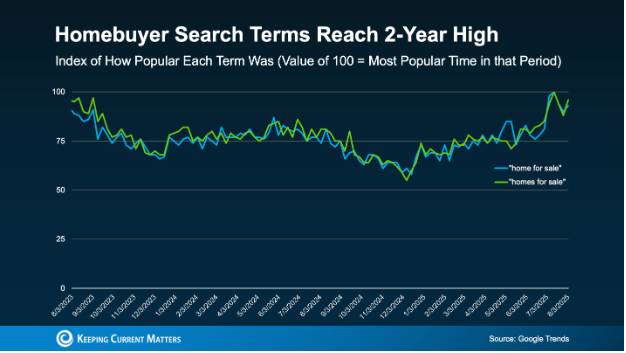
This is especially notable given the challenges in today’s market. Mortgage rates are higher than they were a few years ago, and home prices remain elevated in many areas. But clearly, these factors aren’t scaring everyone off. Buyers are still browsing listings, saving favorites, and watching for price changes.
Why AI Is Changing the Way Buyers Search
Here’s where things get even more interesting: many of the tools buyers use today are powered by artificial intelligence. That means the moment someone starts searching, they’re likely seeing AI-curated recommendations based on their browsing behavior, location, and preferences.
- Listing algorithms can highlight properties that match a buyer’s style, budget, and commute time.
- Smart mortgage calculators give instant estimates on payments, sometimes factoring in local taxes and insurance automatically.
- AI chat tools answer homebuying questions 24/7, keeping buyers engaged while they browse.
This creates a more personalized, targeted home search experience, and if your home isn’t listed, you’re essentially invisible to those algorithms. In today’s market, not being in the AI-driven mix means missing a chunk of the most active and ready buyers.


Why This Matters for Sellers
No, this isn’t a repeat of the 2021 frenzy. But it is a sign of a different kind of demand: buyers who have been watching the market for months, waiting for the right home to appear. These aren’t people that are “just browsing,” but are instead motivated, doing the math, and getting ready to make a move when the right property shows up.
If you’re waiting for the “perfect” moment to list, remember:
- You don’t need ten offers to sell your home, you just need one qualified, motivated buyer.
- Some of the most serious buyers are out there right now, setting up alerts so they can jump the moment something fits their needs.
- Interest is already building and the data proves it.
What You Can Do Next
If you’ve been hesitant to list because you’re unsure whether there’s enough demand, these search trends might be the green light you need.
- Talk to a local real estate agent who understands your market and can help position your home strategically.
- Highlight what makes your property stand out and remember that AI-powered search tools often prioritize listings with complete descriptions, great photography, and accurate details.
- Be prepared to move quickly, because serious buyers are often ready to tour and make an offer right away when they find the right match.
The Bottom Line
If you’ve been telling yourself, “I’ll sell once buyers come back,” it’s time to rethink that. They’re already here, and they’re looking!
Getting your home on the market now means you could show up in more searches, both the old-fashioned kind and the AI-powered ones. Your perfect buyer could be one click away, so don’t let them scroll past without seeing your home.
Let’s Chat.
Are you ready to navigate the real estate market with confidence? Contact us today to discuss how you can take advantage of current market opportunities.
Michelle Oddo
Mortgage Wealth Advisor, The Oddo Group
michelle.oddo@goluminate.com
(303) 961-6906

Home Prices Cooling Off?
Are Home Prices Finally Starting to Cool Off?
For years, home prices seemed like they could only go one direction: up. But fresh data suggests we might be entering a turning point, and for both buyers and sellers, that could mean a shift in strategy.
Let’s unpack what’s really happening in the housing market right now and what it means for your next move.
Price Growth is Slowing
In June, home prices across the country were up 2.0% compared to last year, according to CoreLogic. That is slightly lower than the 2.2% increase in May. Two other major reports, the FHFA and Case-Shiller indices, show similar results.
The bigger news is that monthly growth nearly stopped. In June, prices rose just 0.03%, compared to 0.3% in May. Because of this slowdown, CoreLogic has lowered its 2025 forecast from a 3% increase to no growth at all. That means some areas could even see prices drop in the months ahead.
Some Areas Are Cooling Faster Than Others
While national numbers are cooling, local markets tell a more dramatic story:
- West Coast & Sun Belt: These regions are seeing the biggest declines, with 16 of the 20 largest cities reporting price drops over the last three months.
- Midwest & Northeast: Still going strong, with cities like Buffalo and Indianapolis topping the charts for price gains in June.
- Inventory Matters: Regions with flat or falling prices also tend to have much higher inventory levels, which is a sign of shifting power from sellers to buyers.
The Affordability Crunch
Even with signs of cooling, affordability remains a challenge: buying is currently cheaper than renting in just 1% of metro areas.
For many potential buyers, higher mortgage rates have been the main barrier. But if prices begin to slip and rates stabilize or dip, that equation could change—and quickly.
Construction Trends Won’t Solve Supply Overnight
In June, housing starts jumped 4.6% month-over-month, but permits edged down 0.1%. Meanwhile, residential construction spending fell across the board.
Translation? We’re not on track to build our way out of the housing shortage anytime soon. Inventory may still be tight in many markets, even if prices soften.
What This Means for You
- If you are buying: Look for signs of more homes on the market and slower price increases. This could give you more negotiating power.
- If you are selling: Consider listing sooner if your local market is starting to cool, to capture stronger prices.
- If you are investing: Pay attention to regional differences. Midwest and Northeast markets may still offer steady growth potential.
At Luminate Bank, we watch these trends closely so our clients can make confident decisions. Whether you are getting pre-approved, using your home’s equity, or looking for the right mortgage program, we can guide you through your options.
Thinking about your next step? Talk with one of our mortgage specialists about your goals and the opportunities available in today’s market.
Let’s Chat.
Are you ready to navigate the real estate market with confidence? Contact us today to discuss how you can take advantage of current market opportunities.
Michelle Oddo
Mortgage Wealth Advisor, The Oddo Group
michelle.oddo@goluminate.com
(303) 961-6906

Credit Score You Need to Buy a Home
What Credit Score Do You Really Need to Buy a Home?
Here’s a stat that might surprise you: According to Fannie Mae, 90% of homebuyers either don’t know what credit score lenders are looking for, or they assume it’s higher than it really is.
That means you might be closer to homeownership than you think.
When it comes to credit scores, there’s no one magic number that guarantees a mortgage. In fact, there’s a lot more flexibility than most people realize. Let’s break it down with some real numbers.
There’s No One-Size-Fits-All Score
Your credit score plays a role in the type of loan you qualify for, but it’s not a pass/fail situation. This graphic shows the median credit scores of recent buyers across different loan types:
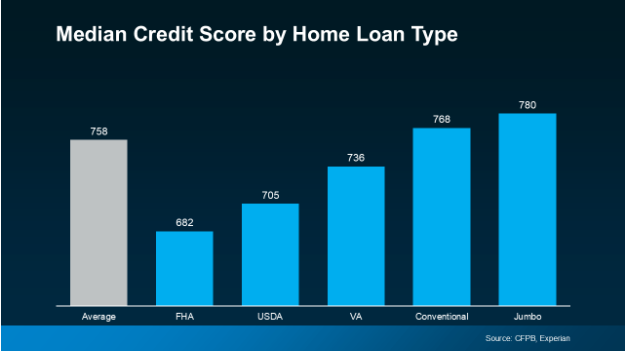
What does that tell you? There’s no single score that unlocks the door to homeownership. And that’s good news. Because you don’t have to be perfect, you just need to know your options.
As FICO puts it:
“While many lenders use credit scores like FICO Scores to help them make lending decisions, each lender has its own strategy, including the level of risk it finds acceptable. There is no single ‘cutoff score’ used by all lenders, and there are many additional factors that lenders may use…”
Why Credit Still Matters
Your credit score helps lenders understand how you handle money, whether you pay bills on time, how much debt you carry, and how responsibly you use credit.
It also plays a big part in:
- What loan types you qualify for
- The terms of your loan
- The mortgage rate you’re offered
And since your mortgage rate can affect how much home you can afford, it’s a key factor to keep in mind.
As Bankrate explains:
“Your credit score is one of the most important factors lenders consider when you apply for a mortgage. Not just to qualify for the loan itself, but for the conditions: Typically, the higher your score, the lower the interest rates and better terms you’ll qualify for.”
But don’t let that stress you out. A less-than-perfect score doesn’t automatically disqualify you, it just means it’s time to explore what options are available.
Want To Boost Your Score? Start Here
Improving your credit score doesn’t have to feel overwhelming. It’s not about doing everything perfectly, it’s about making small, consistent moves that add up over time. Whether you’re planning to buy a home soon or just want more control over your financial future, here are a few smart strategies to get started, straight from the Federal Reserve Board (with a little Luminate spin):
Pay Your Bills on Time
It sounds simple, but it’s one of the most powerful things you can do. Your payment history makes up a big chunk of your credit score. That includes credit cards, car loans, utilities, and even your phone bill. Set up auto-pay or calendar reminders if you need to. On-time payments show lenders you’re reliable.
Keep Your Balances Low
This is all about credit utilization, a fancy term for how much of your available credit you’re actually using. Ideally, try to keep that number below 30%. So if you have a $10,000 credit limit, aim to use less than $3,000. The lower your balances, the better your score can be.
Review Your Credit Reports
Mistakes happen. And even small errors (like a misreported late payment or an account that doesn’t belong to you) can pull your score down. You’re entitled to a free credit report each year from all three major bureaus (Equifax, Experian, and TransUnion) at AnnualCreditReport.com. Spot something off? Dispute it right away.
Don’t Open New Accounts Unless You Have To
Every time you apply for credit, it can trigger a hard inquiry, which might temporarily dip your score. Plus, opening too many new accounts at once can signal a risk to lenders. Focus on maintaining your current accounts and building a strong payment history instead.
Consider a Credit-Building Tool
If your score needs a bigger lift, you’re not out of options. Tools like secured credit cards, credit-builder loans, or even becoming an authorized user on someone else’s well-managed card can help you add positive credit activity to your report.
Bottom Line
Your credit doesn’t have to be perfect to become a homeowner. And chances are, your score may already be in a better place than you think.
The best way to find out where you stand? Talk to a lender who sees the full picture, not just the numbers. At Luminate Bank, we’re here to help you understand your credit, explore your options, and guide you confidently toward homeownership.
Let’s Chat.
Are you ready to navigate the real estate market with confidence? Contact us today to discuss how you can take advantage of current market opportunities.
Michelle Oddo
Mortgage Wealth Advisor, The Oddo Group
michelle.oddo@goluminate.com
(303) 961-6906

What’s Ahead for the Housing Market in 2025?
What’s Ahead for the Housing Market in 2025?
Your Mid-Year Forecast
Assuming you’ve been paying attention, you have likely noticed that the housing market has already seen a few changes this year. But what’s next? Whether you’re buying, selling, or just staying informed, we have a few insights on what experts are saying about home prices, mortgage rates, and what it all means for your next move.
So, Are Home Prices Going to Drop?
It’s a common (and valid) question, especially for buyers hoping for more affordability in a pricey market. And while you probably have seen headlines about prices dipping in certain areas, let’s zoom out and look at the bigger picture. Here’s what we know:
Price growth is slowing down, but that doesn’t mean prices are falling off a cliff. According to the National Association of Home Builders (NAHB):
“House price growth slowed…partly due to a decline in demand and an increase in supply. Persistent high mortgage rates and increased inventory combined to ease upward pressure on house prices.”
Translation? The market’s cooling, not crashing.
In fact, a national average of eight major forecasts shows home prices are still expected to rise 1.5–2% in 2025:
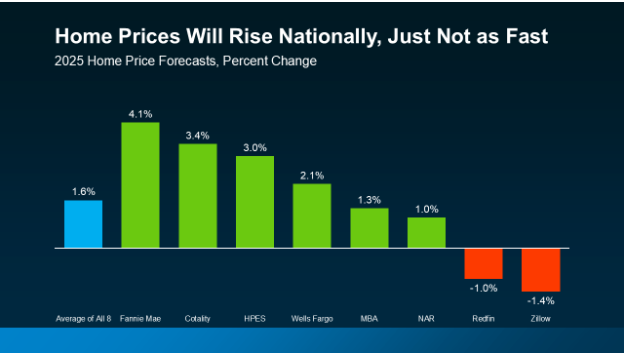
And while some local markets are seeing modest declines (averaging -3.5%), that’s nothing like the 20% drop we saw during the 2008 housing crisis. Plus, when you consider that home prices have jumped 55% nationally over the past five years (FHFA data), a small dip doesn’t reverse much of that growth.
What This Means for You
If you’re waiting on the sidelines of homeownership, hoping for a major drop, you could be missing your window. Prices are expected to stay steady, or even inch upward, depending on your local market. Partnering with a knowledgeable mortgage and finance pro can help you understand what’s really happening in your area.
Are Mortgage Rates Coming Down?
Another popular strategy we hear: “I’m going to wait for rates to fall before I buy.” It’s understandable, but here’s why that could backfire.
According to Yahoo Finance:
“If you’re looking for a substantial interest rate drop in 2025, you’ll likely be left waiting.”
The latest projections from the Federal Reserve and leading economists show mortgage rates holding steady in the mid-6% range through to the end of 2025:
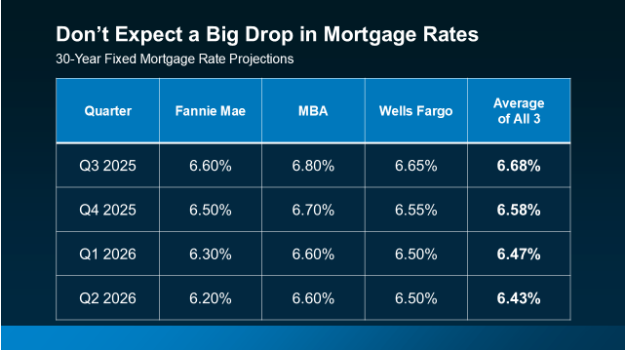
That’s close to where rates are today. So, if you’re postponing your plans in hopes of a major rate drop, you might be waiting a while.
What This Means for You
Don’t let perfect conditions become the enemy of progress. If moving now supports your financial or lifestyle goals, let’s talk strategy. We’ll help you understand how to navigate today’s rate environment and what steps can give you more buying power.
Inflation, job data, and Federal Reserve decisions can all impact rate movement. Having an expert in your corner who’s tracking those trends can make all the difference.
The Takeaway for Buyers and Sellers
This year’s housing market is more balanced than it may seem. Home prices are rising more moderately, and mortgage rates are projected to hold steady. Remember, this points to a market in transition, not turmoil.
So whether you’re buying your first home, moving up, or considering selling, making a smart move means focusing on your personal goals, not just the headlines.
Trying to time the market perfectly can leave you feeling stuck. Instead, let your own needs, timeline, and financial picture guide your decision-making.
At Luminate Bank, we’re here to help you make confident choices in any market. Connect with a local loan expert who can help you break down the numbers, understand your options, and plan your next step with clarity.
Let’s Chat.
Are you ready to navigate the real estate market with confidence? Contact us today to discuss how you can take advantage of current market opportunities.
Michelle Oddo
Mortgage Wealth Advisor, The Oddo Group
michelle.oddo@goluminate.com
(303) 961-6906

Multi-Generational Home = More Buying Power?
Could a Multi-Generational Home Help You Afford Homeownership?
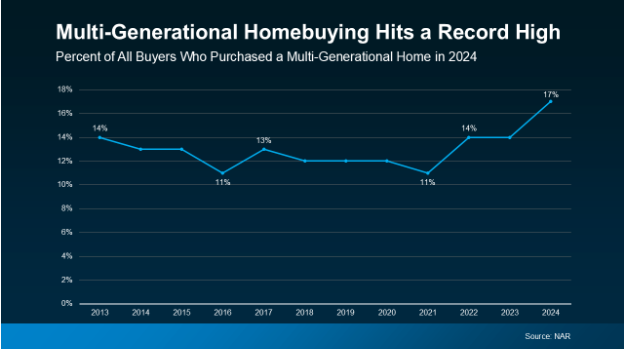
Multi-generational living isn’t just a passing trend but is instead becoming a go-to strategy for today’s homebuyers. According to the National Association of Realtors® (NAR), 17% of buyers purchased a home to share with parents, adult children, or extended family. That’s the highest share ever recorded.
So what’s fueling this shift? In one word: affordability.
NAR reports that “in 2024, a notable 36% of homebuyers cited ‘cost savings’ as the primary reason for purchasing a multigenerational home — a significant increase from just 15% in 2015.”
A decade ago, the top motivation for multi-generational living was usually caregiving, specifically for aging parents who needed support. That’s still important, but with today’s higher home prices and mortgage rates, saving money has officially taken the lead.
Pooling Resources Can Make Homeownership Possible
For many people, the dream of owning a home feels just out of reach, and unfortunately the numbers back that up. Rising home values and interest rates have pushed monthly payments higher, which makes qualifying on your own more difficult.
That’s why more families are coming together to pool their financial resources. By combining incomes, you can qualify for a larger loan, afford a better property, and still have breathing room in your budget. You’re not just sharing a roof, you’re sharing the costs of the mortgage, utilities, taxes, and even maintenance.
And this isn’t just about scraping by either, it can also help you afford more home than you could on your own. That means more bedrooms, more bathrooms, or even space for a home office or in-law suite.
Planning Ahead: Finances and Family
If you’re thinking about buying a multi-generational home, a little financial planning can go a long way. Here are a few tips to help make the transition smoother:
- Set clear expectations early. Decide upfront how the mortgage and other expenses will be split and put it in writing. This avoids misunderstandings down the road.
- Consider everyone’s credit and income. When you apply for a mortgage together, lenders will consider everyone’s finances, so it’s a good idea to check credit scores and debt-to-income ratios beforehand.
- Plan for the long term. Think beyond just buying the home. What happens if someone’s income changes? Or if one family member wants to move out in a few years? A financial advisor can help you plan for these scenarios.
- Work with a knowledgeable lender. Not all loan programs are the same and some may work better for multi-generational households than others. A lender who understands your goals can help you find the right fit.
It’s clear that multi-generational housing is becoming popular again, with nearly 3 in 10 homebuyers saying they’re considering a multi-generational home for their next move.
Could This Be the Right Move for You?
Even with this big step forward, some things remain unchanged: lenders will continue to use data from all three credit bureaus (the tri-merge) for now. Plans to move to a bi-merge system, which would rely on just two bureaus, are currently on hold.
So for now, you don’t need to worry about any big shifts in how your credit is reported. But you might notice lenders offering more flexible options in the months ahead.
Bottom Line
If your budget feels tight, buying a home with family could be a creative, practical way to reach your homeownership goals.
Would you consider teaming up with family to buy a home? Let’s connect and talk through your options. Together, we’ll find the path that works best for your future.
Let’s Chat.
Are you ready to navigate the real estate market with confidence? Contact us today to discuss how you can take advantage of current market opportunities.
Michelle Oddo
Mortgage Wealth Advisor, The Oddo Group
michelle.oddo@goluminate.com
(303) 961-6906

Big Credit Score Changes
Big Credit Score Changes Could Help You Qualify for a Mortgage
We have good news for aspiring homeowners: buying a home just got a little more accessible, and that’s something worth celebrating.
In a move aimed at increasing access to homeownership and lowering costs, the Federal Housing Finance Agency (FHFA) announced that Fannie Mae and Freddie Mac will now accept the VantageScore 4.0 credit model, effective immediately.
If you’re wondering what this means for you, keep reading. We’ll break it down and show you why these changes could open the door to homeownership, even if you’ve struggled to qualify in the past.
What’s Changing?
Historically, most mortgage lenders have relied on the FICO credit score, calculated from data at all three major credit bureaus (known as a tri-merge). This isn’t going away just yet, but starting now, lenders can also use VantageScore 4.0 without building any new systems or infrastructure.
Why does this matter to you? It matters because VantageScore 4.0 considers more than just the traditional data points that major credit bureaus utilize. It can include things like on-time rent payments, which is a huge plus for renters who’ve proven they can reliably pay monthly bills but might not have much other credit history.
In fact, VantageScore estimates this change could help about 33 million more Americans see a credit score on their reports. This will give many families their first real shot at a mortgage, and Luminate Bank is ready to help you make the most of it.
Why Now?
According to the FHFA’s Director, Bill Pulte, the move is about increasing competition, lowering costs, and giving more creditworthy people a chance to buy homes.
Rising costs of credit reports and concerns about fairness have fueled a push for alternatives to the traditional FICO-only approach. By accepting VantageScore, the FHFA hopes to expand access for groups who’ve historically struggled to qualify, including rural residents and consistent renters.
As Pulte put it, this change can help “forgotten Americans” by lowering closing costs and expanding opportunities.
What’s Staying the Same?
Even with this big step forward, some things remain unchanged: lenders will continue to use data from all three credit bureaus (the tri-merge) for now. Plans to move to a bi-merge system, which would rely on just two bureaus, are currently on hold.
So for now, you don’t need to worry about any big shifts in how your credit is reported. But you might notice lenders offering more flexible options in the months ahead.
What This Means For You
If you’ve been hesitant to apply for a mortgage because you thought your credit history wasn’t strong enough, now could be your moment.
Thanks to alternative data like your on-time rent and utility payments, more borrowers may qualify for a home loan. Even if you’ve applied before and didn’t quite qualify, now is a great time to take another look.
At Luminate Bank, our mortgage experts are here to help you navigate the process, review your unique situation, and find the loan option that fits your needs, no matter what credit model is used. Your dream of owning a home may be closer than you think, and we’re here to guide you every step of the way.
Ready to Explore Your Options?
Buying a home should feel exciting, not intimidating. If you’re curious about how these credit scoring changes might help you, we’re here to guide you.
Start your homebuying journey today with confidence! Reach out to your Luminate Bank mortgage advisor to get started.
Let’s Chat.
Are you ready to navigate the real estate market with confidence? Contact us today to discuss how you can take advantage of current market opportunities.
Michelle Oddo
Mortgage Wealth Advisor, The Oddo Group
michelle.oddo@goluminate.com
(303) 961-6906

Make This Market Work for Your Finances
Moving On? Here’s How to Make This Market Work for Your Finances
If you’re thinking about selling your home, there’s good news: the housing market is settling into a healthier, more balanced place. And while it might not sound exciting at first, this shift is actually a smart opportunity for sellers who play it right.
Over the past few years, we’ve all gotten used to fast sales, bidding wars, and sky-high prices. But that was the exception, not the rule. What we’re seeing now is a return to normal, and with the right approach, it can still work in your financial favor.
Here’s how sellers are winning in today’s market.
1. Inventory Is Up. And So Is Buyer Power.
The number of homes for sale is climbing back toward pre-pandemic levels. For you, that means your local market might look a little different than it did even a year ago.
- In areas with more available homes, buyers have more options, and they’re taking their time.
- In markets where inventory is still tight, competition remains strong, and homes can still sell fast.
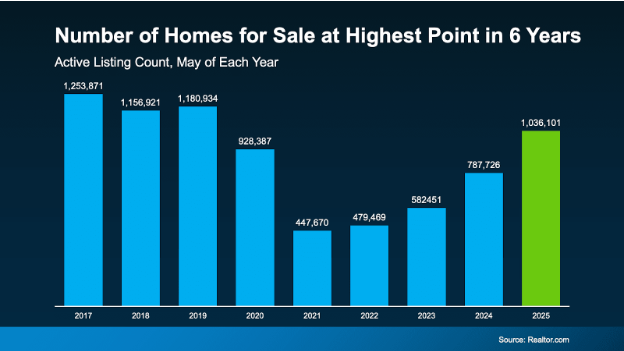
No matter where you live, your strategy matters. That’s where a trusted real estate expert comes in. They can help you adjust your pricing, timing, and marketing to match what buyers are looking for right now.
💡 Luminate Tip: Thinking about how the sale of your home might impact your next financial move? Talk to a Luminate Bank mortgage expert to map out how the equity in your home could support your next chapter.
2. Pricing Strategically Is Everything
Buyers today are paying attention, and they’re not afraid to pass on homes that seem overpriced. In fact, nearly 1 in 5 sellers have had to reduce their asking price to stay competitive.
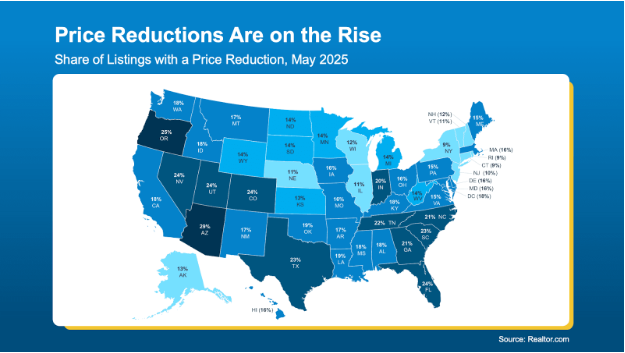
As Realtor.com puts it:
“A seller listing a well-priced, move-in ready home should have little problem finding a buyer.”
The key is to price your home right from the start. That means letting go of outdated pricing expectations and leaning into the latest data and feedback from your agent.
💡 Luminate Insight: Your home is likely your largest financial asset. Getting the pricing right protects your equity and positions you for success on your next purchase. That’s smart money management.
3. Flexibility Can Seal the Deal
Today’s buyers aren’t waiving inspections or throwing in wild offers just to compete. They’ve got options, and they’re using them. Repairs, credits, and closing cost help are all back on the table.
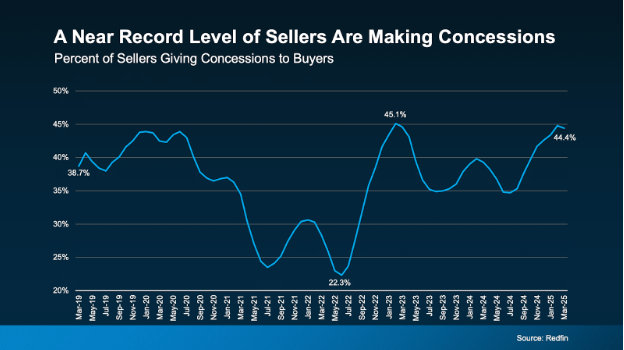
Redfin reports that nearly 44.4% of sellers are offering some kind of concession. That’s not a sign of a weak market; it’s a sign of a healthy one.
Offering a small concession can make a big difference and still leave you ahead, especially when you consider that home values have increased by over 55% in the past five years.
💡 Luminate Reminder: If your goal is to walk away with the strongest financial outcome, flexibility is your friend. The right concessions can protect your timeline and keep your sale moving.
The Bottom Line
This market isn’t bad, it’s just balanced. And sellers who embrace that shift with the right mindset and expert guidance are still walking away with solid results.
If you’re ready to talk strategy, Luminate Bank is here to support your entire financial journey. From leveraging your home equity to preparing for your next purchase, our experts are ready to help you make smart, confident moves.
Let’s talk about what’s happening in your neighborhood and how to make your next step a financial win.
Let’s Chat.
Are you ready to navigate the real estate market with confidence? Contact us today to discuss how you can take advantage of current market opportunities.
Michelle Oddo
Mortgage Wealth Advisor, The Oddo Group
michelle.oddo@goluminate.com
(303) 961-6906

The Right Home Loan
Buying Your First Home? Here’s How the Right Loan Can Make It Happen
If you’re looking to buy your first home, it’s easy to feel overwhelmed, especially in today’s market. High home prices, rising rents, and economic uncertainty can make homeownership seem out of reach. But the truth is, there are smart financing tools out there that can open the door to your first home sooner than you might think.
One of the most powerful tools for first-time buyers? A Federal Housing Administration (FHA) loan. But it’s not the only one, and depending on your situation, there may be multiple loan options that help you move from renting to owning without breaking your budget.
Buying Your First Home Isn’t Always Easy (Financially Speaking)
Let’s be honest: affordability is the biggest hurdle for first-time homebuyers. According to a recent 1000WATT survey, the top two financial worries are saving enough for a down payment and managing the monthly mortgage at today’s rates and home prices (see chart below):
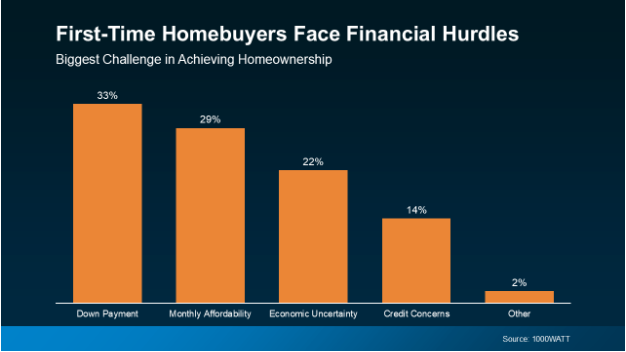
That’s why it’s more important than ever to choose a financing strategy that works for your goals and your wallet.
FHA Loans Can Ease the Financial Pressure
FHA loans were designed to help buyers who might not have perfect credit or a large down payment saved up. That’s why they continue to be one of the most popular options for first-time buyers.
According to data from Intercontinental Exchange, the average down payment for first-time buyers using FHA financing is just $16,000 compared to $77,000 for a conventional loan (see chart below):
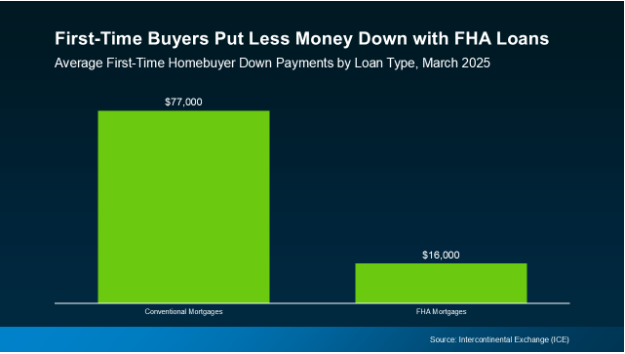
That difference can make or break your ability to buy a home, especially when you’re just getting started financially.
More Than Just a Lower Down Payment
FHA loans often come with competitive (and sometimes even lower) interest rates than conventional options. According to Bankrate:
“FHA loan rates are competitive with, and often slightly lower than, rates for conventional loans.”
Lower upfront costs and potentially lower monthly payments? That’s a win-win for buyers looking to build wealth through homeownership.
And while FHA loans are a great option, they’re just one of several pathways to owning your first home. Depending on your income, location, or employment status, you may qualify for other options like:
- Down payment assistance programs
- First-time buyer grants
- VA or USDA loans (if eligible)
- Low down payment conventional loans
The key is working with a trusted financial expert who can walk you through all your options and help you create a plan that supports your financial future, not just your home purchase.
Let’s Talk Strategy, Not Just Mortgages
At Luminate Bank®, we believe homeownership should be empowering, not intimidating. That’s why we focus on helping you understand all the financial pieces of the puzzle, from credit to closing.
When you work with a loan expert who truly understands your goals, you gain more than a mortgage, you gain a long-term partner in your financial journey.
Bottom Line:
You don’t need a giant savings account or perfect credit to become a homeowner. With the right strategy and support, your path to homeownership can start today.
Ready to take the first step? Talk to a Luminate Bank mortgage expert about your options. Let’s find the right loan to unlock your future.
Let’s Chat.
Are you ready to navigate the real estate market with confidence? Contact us today to discuss how you can take advantage of current market opportunities.
Michelle Oddo
Mortgage Wealth Advisor, The Oddo Group
michelle.oddo@goluminate.com
(303) 961-6906

A Win for Borrowers and Lenders
A Win for Borrowers and Lenders: Congress Moves to Curb Abusive Trigger Leads
The mortgage world just took a major step forward in protecting consumers and mortgage professionals alike. In a unanimous 46-0 vote, the House Financial Services Committee approved H.R. 2808, a bipartisan legislation aimed at ending the misuse of mortgage “trigger leads.” This marks a significant win for the industry and an even bigger win for your peace of mind.
First, What Are Trigger Leads?
Trigger leads are generated when a consumer applies for a mortgage loan and a credit inquiry is made. Credit bureaus then sell this information to other lenders, who use it to aggressively solicit those same consumers, often bombarding them with calls, emails, and even misleading offers.
While legal, this practice has long raised serious concerns about privacy, client poaching, and consumer confusion. That’s why this latest move by Congress is such a big deal.
What’s in the Bill?
H.R. 2808, now moving swiftly through Congress, mirrors a Senate-passed version from last year with only one addition: a Government Accountability Office (GAO) study to further investigate the issue. This legislation:
- Protects consumer data by limiting how mortgage credit inquiries can be used for unsolicited marketing.
- Safeguards lender-client relationships by preventing other lenders from exploiting credit inquiries to poach clients mid-process.
- Ensures fair treatment of all lenders, including smaller independent mortgage banks (IMBs), which were initially excluded from prior versions of the bill.
You can read the full text of the bill here: H.R. 2808
Who Fought For This and Won?
The push to curb abusive trigger leads wasn’t driven by one organization but instead the result of a broad, sustained coalition effort. Groups like the Community Home Lenders of America (CHLA) and the Mortgage Bankers Association (MBA) played major roles in getting this legislation across a crucial milestone.
CHLA helped reignite interest in 2022 with a letter to the CFPB and worked to ensure protections for smaller lenders. Meanwhile, MBA led the charge on legislative language, policy formation, and direct Congressional advocacy. Their teams engaged in countless meetings, negotiated amendments, and helped unify diverse interests which included brokers, banks, credit unions, and consumer advocates.
This collaboration is a great example of what happens when industry voices align on behalf of consumers and client relationships.
Why This Matters for You
Whether you’re applying for a mortgage or helping someone navigate their home loan journey, you deserve a process free from unnecessary pressure and predatory sales tactics. This legislation does just that:
- For homebuyers: You’ll no longer be overwhelmed by unwanted solicitations just because you applied for a loan.
- For lenders: Your client relationships are better protected, giving you the freedom to serve without interference.
What’s Next?
The bill is expected to pass quickly through the Senate since it closely mirrors what’s already been approved, and then move on to the President’s desk for signature.
Final Thoughts
This is more than just a policy update, it’s a moment of progress. It shows what’s possible when real concerns are heard, advocacy is strategic, and lawmakers work across the aisle to create better outcomes for borrowers and lenders alike.
We’ll keep you updated every step of the way. But for now, take a moment to celebrate: Your voice, your data, and your work just got the protection they deserve.
Let’s Chat.
Are you ready to navigate the real estate market with confidence? Contact us today to discuss how you can take advantage of current market opportunities.
Michelle Oddo
Mortgage Wealth Advisor, The Oddo Group
michelle.oddo@goluminate.com
(303) 961-6906

